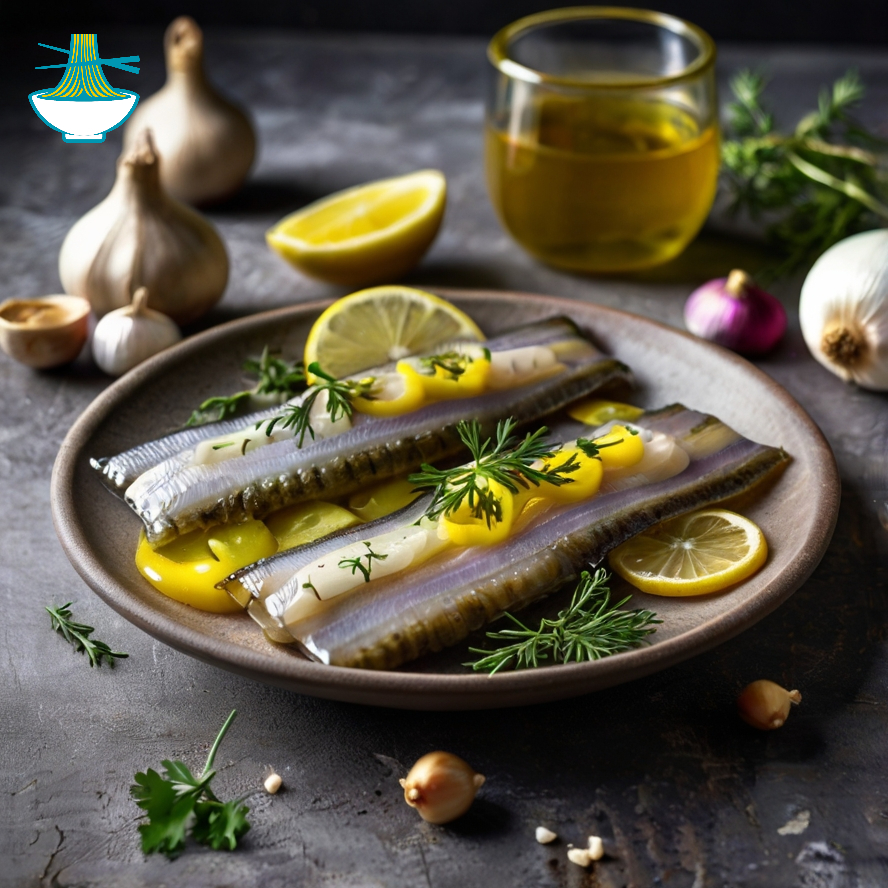Discover how to make classic pickled herring at home with our easy recipe. Choose from delicious flavors like tangy mustard, savory onion, or aromatic garlic. Perfect for a traditional Scandinavian feast or a flavorful appetizer. Learn the simple steps to pickle herring and enjoy this timeless dish.
Ingredients:
- 1 lb (450g) herring fillets, cleaned and boned
- 1 cup white vinegar
- 1 cup water
- 1 cup sugar
- 1 tbsp salt
- 1 tsp black peppercorns
- 1 tsp mustard seeds
- 1 bay leaf
- 1 small onion, thinly sliced
- 2 cloves garlic, thinly sliced
- Optional: 1 tbsp dried dill or 1/4 cup fresh dill
Instructions:
Prepare the Herring:
- Rinse the herring fillets under cold water and pat dry with paper towels. Cut into bite-sized pieces if desired.
Make the Pickling Brine:
- In a medium saucepan, combine vinegar, water, sugar, and salt. Bring to a boil over medium heat, stirring until sugar and salt are completely dissolved. Remove from heat and let cool.
Prepare the Flavors:
- In a clean jar or container, layer the herring pieces with onion slices, garlic, and any optional herbs like dill. Add peppercorns, mustard seeds, and bay leaf.
Pickle the Herring:
- Pour the cooled brine over the herring, ensuring all pieces are submerged. Seal the jar or container with a lid.
Refrigerate:
- Refrigerate for at least 24 hours before serving to allow flavors to meld. For best results, let it pickle for 3-4 days.
Serve:
- Enjoy the pickled herring chilled as an appetizer or a flavorful addition to salads, sandwiches, or traditional dishes.
Tips:
- The pickled herring will keep in the refrigerator for up to 2 weeks.
- Experiment with different flavorings like chili flakes or whole cloves to suit your taste.
Nutritional values
Herring Fillets (1 lb or 450g)
- Calories: 237 kcal
- Protein: 25g
- Fat: 14g
- Carbohydrates: 0g
- Omega-3 fatty acids: 2.2g
Benefits:
- High in protein, supporting muscle growth and repair.
- Rich in omega-3 fatty acids, promoting heart health and reducing inflammation.
- Contains vitamins D and B12, supporting bone health and red blood cell formation.
White Vinegar (1 cup)
- Calories: 0 kcal
- Carbohydrates: 0g
- Protein: 0g
- Fat: 0g
Benefits:
- Adds flavor without calories.
- May aid in digestion and blood sugar regulation.
- Acts as a preservative in pickling.
Water (1 cup)
- Calories: 0 kcal
Benefits:
- Essential for hydration and various bodily functions.
- Acts as a base for pickling solutions and helps dissolve ingredients.
Sugar (1 cup)
- Calories: 774 kcal
- Carbohydrates: 200g
Benefits:
- Provides sweetness and energy.
- Used in moderation for flavor balancing in pickling.
Salt (1 tbsp)
- Sodium: 2,325mg
Benefits:
- Essential for fluid balance and nerve function.
- Used for flavoring and preserving in pickling.
Black Peppercorns (1 tsp)
- Calories: 6 kcal
- Carbohydrates: 1.5g
- Protein: 0.2g
- Fat: 0.1g
Benefits:
- Contains piperine, which may enhance nutrient absorption.
- Adds a spicy flavor and has potential digestive benefits.
Mustard Seeds (1 tsp)
- Calories: 9 kcal
- Carbohydrates: 1g
- Protein: 0.5g
- Fat: 0.5g
Benefits:
- Contains antioxidants and may have anti-inflammatory properties.
- Adds a tangy flavor to pickling solutions.
Bay Leaf (1)
- Calories: 1 kcal
- Carbohydrates: 0.3g
- Protein: 0g
- Fat: 0g
Benefits:
- Adds aromatic flavor to dishes.
- Contains antioxidants and may aid in digestion.
Small Onion (1, thinly sliced)
- Calories: 44 kcal
- Carbohydrates: 10g
- Protein: 1g
- Fat: 0.1g
- Fiber: 2g
Benefits:
- Provides antioxidants and vitamins C and B6.
- Adds flavor with minimal calories.
Garlic Cloves (2, thinly sliced)
- Calories: 4 kcal
- Carbohydrates: 1g
- Protein: 0.2g
- Fat: 0g
Benefits:
- Known for cardiovascular and immune-boosting properties.
- Contains allicin, which may have antimicrobial and anti-inflammatory effects.
Dried Dill (1 tbsp) or Fresh Dill (1/4 cup) (Optional)
- Calories: 5 kcal
- Carbohydrates: 1g
- Protein: 0.3g
- Fat: 0g
Benefits:
- Adds a fresh, herby flavor.
- Contains antioxidants and may aid in digestion.
- Fresh dill provides similar benefits and is also rich in vitamins A and C.


Comments